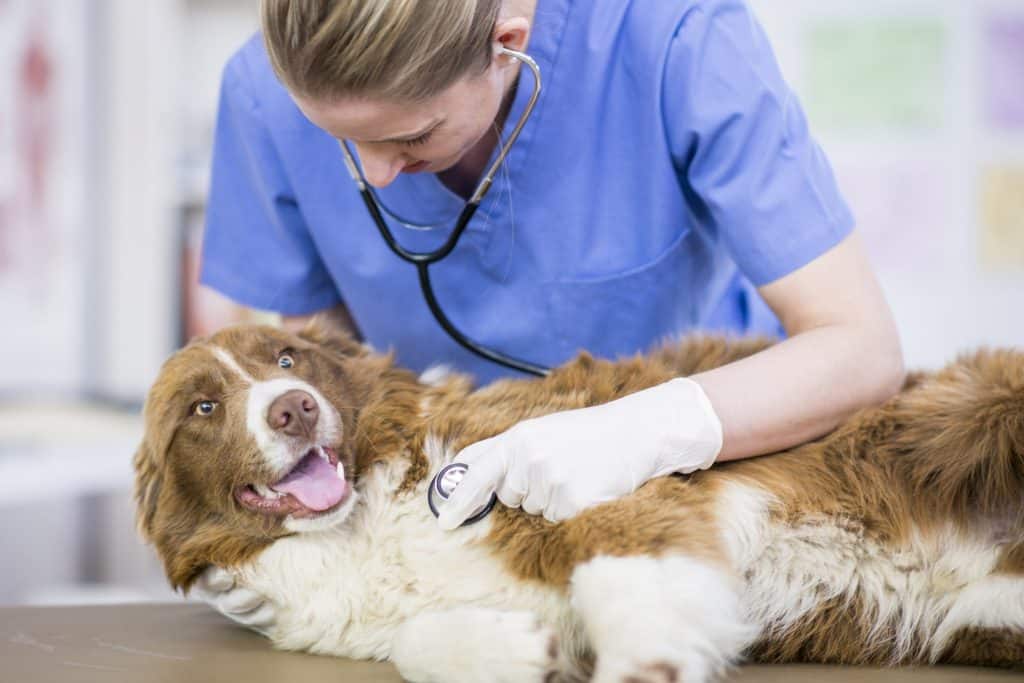Bladder stones, or cystic calculi, are mineral deposits that grow in your dog’s bladder or ureter. They impact your dog’s ability to pee and cause severe discomfort. The two most common types of bladder stones in dogs are struvite stones and calcium oxalate stones. While every type of stone can worsen over time, there are some that are considered an emergency regardless of duration. In these cases, treatment usually involves surgery.
However, Dr Laura de Armas, a veterinarian from the Veterinary Emergency Group (VEG), says some stones, such as struvite stones and urate stones, can often dissolve over several weeks with special diets. She explains that these diets work by encouraging increased water consumption and changing the urine’s chemical composition. Read on to learn how to identify a bladder stone, what causes bladder stones, and options for treatment.
Ureter Stones vs. Bladder Stones In Dogs
Bladder stone symptoms will vary depending on where the stone is located and due to inflammation in the bladder. Here are the differences in symptoms between urethra stones and bladder stones in dogs. If you’re still unsure, it’s always best to speak to a vet.
Symptoms of bladder stones
Does your dog toilet on walks but not in the garden? Urinate too much? Pee on your bed? These kinds of behaviours can indicate bladder stones. If you notice a urinary obstruction in your dog, seek treatment immediately, as this can be a life-threatening emergency.
Other signs your dog may have bladder stones include:
- hematuria (blood in urine)
- stranguria (straining to urinate)
- abdominal discomfort
- urinating only a small amount
- urinary tract infection (UTI)
- urinary obstruction (unable to urinate)

iStock/Liudmila Chernetska
Symptoms of ureter stones
Ureterolithiasis is when urinary stones may lodge into and block a dog’s ureter, the muscular tube connecting the kidney and bladder. The ureter carries urine from the kidneys to the bladder. Often, these stones form in the kidneys and pass through to the ureter.
Signs of ureter stones include the following.
- dribbling urine
- ureter rupture
- kidney getting smaller or larger
- straining or posturing to urinate without producing urine
- urinary obstruction
When Are Bladder Stones An Emergency?
Calcium oxalate stones and silica stones require surgery. Although, it’s important to note that all types of stones can pose a medical emergency. Bladder stone symptoms that require immediate vet attention include:
- inability to urinate
- a large and firm bladder
- lethargy
- stomach pain
- vomiting

iStock/alex_ugalek
Types & Causes Of Bladder Stones
Due to their various causes, different crystals form different types of stones. While some stones can be prevented through diet, certain dog breeds are more prone to certain types solely based on their genetics.
In terms of which are the most dangerous, Dr de Armas says all bladder stones can be dangerous, as any type of stone can lead to urinary obstruction and require emergency care.
| Type of Bladder Stone | Causes | Dogs Most Affected |
| Struvite |
|
|
| Calcium Oxalate |
|
|
| Urate |
|
|
| Cystine |
|
|
| Silica |
|
|
How Common Are Bladder Stones?
Different types of bladder stones are prevalent among dogs of different ages. Struvites are the most common bladder stone (around 50% of all cases) and typically happen when dogs are three years old. Additionally, calcium oxalates make up a third of all bladder stones and are seen in dogs aged five to 12. Urates are very uncommon and only make up 5% of cases, and cystines are also uncommon. Finally, the exact prevalence of silicas is still a mystery, but they are often seen in dogs around six years old.

iStock/FatCamera
How To Treat Bladder Stones In Dogs
Since there are multiple causes of bladder stones, different types of stones require different management. If you’ve ruled out behaviours like marking or occasional accidents that require cleanup, and your dog is showing persistent signs of bladder stones, contact a veterinarian.
Additionally, Dr de Armas says a vet will conduct a full diagnostic work-up consisting of bloodwork, urinalysis, X-rays, and possibly an ultrasound to determine the appropriate course of treatment.
Similarly, Dr Tyler Foreman, a veterinarian and managing partner at Dallas Animal Urgent Care, says if the obstruction risk is lower, vets will often turn to conservative treatment first.
Some of the most common treatments for bladder stones overall include the following.
| Treatment | What Is It | Type of Bladder Stones Treated |
| Dietary changes | Low-risk diet changes and antibiotics that lead to bladder stones dissolving. | Struvites, calcium oxalates, urates, and cystines |
| Voiding urohydropropulsion | This non-surgical method consists of filling the bladder, getting the stones to float in the urine, and expelling the stones through a urine stream while the dog is held upright. | Struvites, calcium oxalates, and silicas |
| Cystoscopic retrieval | Cystoscopic retrieval involves inserting a cystoscope into the bladder and removing stones using a basket. | Struvites |
| Surgery | Fastest treatment option to remove bladder stones, but it is riskier. | Struvites, calcium oxalates, cystines, urates, and silicas |
How To Prevent Bladder Stones
For some bladder stones, dietary intervention alone can help prevent or dissolve the stone, eliminating the need for surgery. Long-term monitoring and regular urine testing are especially important for prevention after treatment. Half of all dogs affected get another kidney stone within three years.
Try avoiding foods like meat, fish, and other seafood, while increasing water intake and urine volume. This can help decrease the likelihood of a dog developing bladder stones.

iStock/marcoventuriniautieri
What foods can help prevent bladder stones?
A balanced wet food diet is generally recommended to prevent bladder stones since it contains more moisture. However, because every type of stone has a different cause, special diets that may help prevent one type of bladder stone may not be effective for another.
Diets for preventing calcium oxalate stones are protein restricted. However, the benefits of a low-protein diet are generally unproven. While diet is important in all aspects of a dog’s life, some breeds, like Cocker Spaniels and Dalmatians, have a genetic predisposition for developing bladder stones regardless of diet.
In any case, speak with a vet to find out what diet may be best for your dog to prevent bladder stones from forming or recurring.


